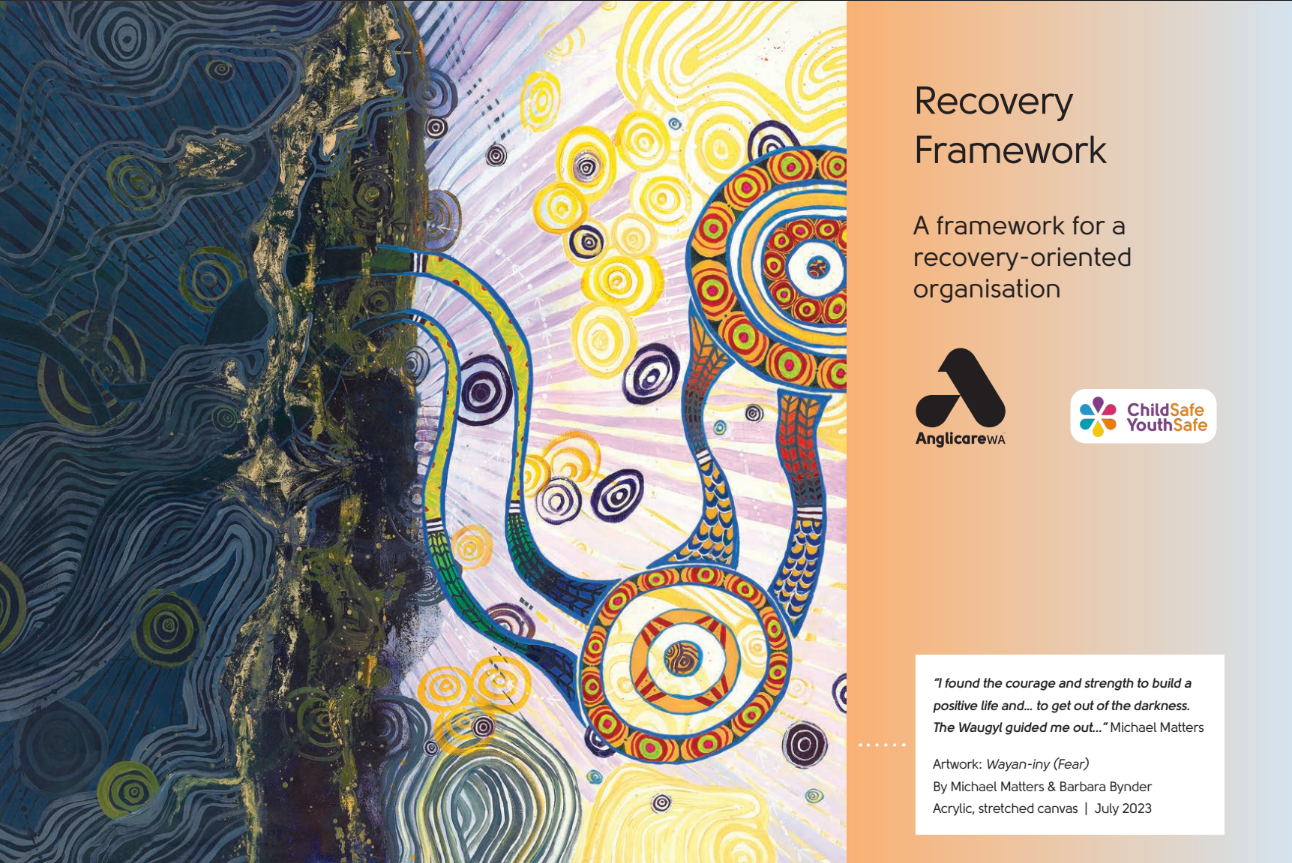.png?language=en)
The Recovery Framework
We aim to align our practice, service delivery, and overall organisational culture with the principles of recovery. This Framework applies to and guides all workers, volunteers, students, leaders, and the Board in how to embed recovery-oriented practices through all the work we do.
The Anglicare WA Recovery Framework is a comprehensive guide designed to embed recovery-oriented practices across all levels of the organisation. It aligns with the National Framework for Recovery-Oriented Mental Health Services and is informed by both research and practical experience.
What is the Recovery Framework for?
- Language and Culture of Hope and Optimism: We create spaces where people feel seen, valued, important, welcome, and safe to access our services.
- Holistic and Person-Centred: We always place the person at the centre of the support they are offered. We consider the whole person and their context and understand that a person and their identity go beyond their psychosocial context and any challenges they may be experiencing.
- Responsive to Diversity: Our services are inclusive and responsive to the diverse needs of Aboriginal and Torres Strait Islander people, people from immigrant and refugee backgrounds, people of all gender identities, sexualities, ages, cultures, and spiritualities, and people of all diversity.
- Support Personal Recovery through Self-Determination and Autonomy: We are clear about our role in offering evidence-based support. We believe people have the capacity to recover, reclaim, and transform their lives and trust they are capable of autonomy and self-determination.
- Focusing on Strengths and Working Collaboratively Alongside People: We believe in people’s strengths and resilience and support this by working collaboratively and alongside them, and in building their community of care.
Workforce Development: Anglicare WA is committed to building the skills and capacity of its workforce to deliver recovery-oriented and trauma-informed services. This includes ongoing training and professional development, informed by the latest research and best practices.
Lived Experience Workforces: The organisation values and grows its lived experience workforces, recognizing the unique insights and contributions of individuals with personal experience of recovery. This practice is supported by research showing the positive impact of peer support and lived experience roles in mental health services.
Community Partnerships and Advocacy: Anglicare WA partners with communities and advocates for social inclusion and the social determinants of health. This approach is informed by research on the importance of community engagement and advocacy in addressing structural issues that impact mental health and wellbeing.
Person-Centred and Holistic Approach: Anglicare WA places individuals at the centre of their care, considering their whole context and identity beyond any diagnosis or challenges. This practice is informed by research that shows the effectiveness of holistic, person-centred care in promoting recovery.
Language and Culture of Hope and Optimism: The framework fosters a culture of hope and optimism, creating spaces where people feel valued and safe. This practice is based on research indicating that positive environments and supportive relationships are crucial for recovery.
Responsive to Diversity: Services are inclusive and responsive to the diverse needs of all individuals, including Aboriginal and Torres Strait Islander people, immigrants, and people of all gender identities and sexualities. This inclusivity is supported by research showing that culturally sensitive and inclusive practices improve outcomes for diverse populations.
Support for Self-Determination and Autonomy: Anglicare WA supports individuals in making their own decisions and steering their recovery journey. This practice is grounded in research that highlights the importance of autonomy and self-determination in recovery.
Strengths-Based and Collaborative: The framework emphasizes working collaboratively with individuals, focusing on their strengths and resilience. Research supports this approach, showing that recognizing and building on strengths leads to better recovery outcomes.
- Foundations in Lived Experience: The concept of recovery-oriented practices originates from the consumer movement, which emphasized the need for hope and dignity in treating people with mental health issues. This movement highlighted the importance of involving people with lived experience in planning their own care.
- National Framework Alignment: The Recovery Framework at Anglicare WA aligns with the National Framework for Recovery-Oriented Mental Health Services, which includes practice domains and key capabilities. This alignment ensures that the practices are evidence-based and adhere to national standards.
- Trauma-Informed Practices: The framework incorporates trauma-informed principles, recognizing the impact of trauma on individuals and integrating this understanding into service delivery. This approach is supported by research on the effects of trauma and the importance of creating safe, supportive environments for recovery.





